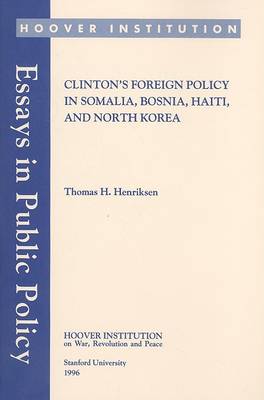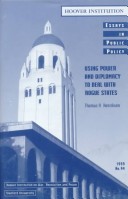Essays in Public Policy
3 total works
Clinton's Foreign Policy in Somalia, Bosnia, Haiti, and North Korea
by Thomas H Henriksen
Half a decade has elapsed since the collapse of the Soviet Union, and nearly four years have passed since Bill Clinton became president of the United States. These two events, nearly stimultaneous in occurrence, present a fitting time for an assessment of specific international policy decisions made by the White House. This juncture is particularly appropriate for an evaluation of President Clinton's handling of prominent foreign polcy crises as he seeks a second term.
The Clinton administration has dealt with four high-profile problems--Somalia, Bosnia, Haiti, and North Korea--which demanded presidential attention, resulted in the deployment of U.S. military forces, and generated congressional and public controversy. All were small-scale operations when compared with U.S. involvement in major twentieth-century conflicts. Yet they are significant because the way they were handled may determine the way future large-scale emergencies are managed.
The Clinton administration displayed hesitation, vacillation, and ambivalence in addressing turmoil in Somalia, Bosnia, and Haiti, which carried international ramifications. Somalia emerges as a defining foreign policy decision for the Clinton administration. After suffering a setback in Somalia, the White House moved overcautiously and abdicated leadership in the Bosnian crisis. When Clinton intervened in Bosnia and Haiti, he first narrowed the operational scope, set rigid timetables, put undue restrictions on the missions, and finally emphasized exit strategies. The results of these American efforts, therefore, are likely to be transitory. In the case of North Korea, the White House has been correct to engage the decrepit but dangerous North Korean regime, but the administration's nuclear agreement is difficult to verify and has secured inadequate quid pro quos in return for American, Japanese, and South Korean inducements for cooperation. Most important, the Geneva Agreement set a bad international precedent in the fight against nuclear proliferation.
Whoever wins the national election and takes office as president must reassert America's moral and strategic leadership to bolster U.S. credibility in a world undergoing profound change. The next president must articulate with clarity and conviction for Congress and the public the importance of America's international responsibilities that accompany its power and influence. Among the specific recommendations for the incoming administration in 1997 are the eastward enlargement of the North Atlantic Treaty Organization, the construction of a missile defense system, and an increase in military spending to meet future crises, which are almost certain to be greater challenges than Somalia, Bosnia, Haiti, or North Korea.
The end of the cold war a decade ago has ushered in a greatly transformed international landscape. Instead of a pacific era of peace and political harmony, the world, and particularly the United States, has been confronted with a menacing challenge of rogue regimes whose propensity for violence is matched by their intentions to disrupt regional stability, contribute to outlaw behavior worldwide, or to possess weapons of mass destruction. Ruthless rogues also endanger American interests and citizens by their active or passive sponsorship of terrorism. If left unchecked, rogue states like Iraq, North Korea, Iran, Libya, and others will threaten innocent populations, undermine international norms, and spawn other pariah regimes, as the global order becomes tolerant of this political malignancy.
As a major beneficiary of a global order of free markets, free trade, growing prosperity, and spreading democracy, the United States, the world's sole superpower, must take the lead in confronting rogue governments, even though our allies may balk from time to time. Specifically, American power should be used to enhance the credibility of our diplomacy. Law and diplomacy alone are unlikely to affect rogue dictators. They must be reinforced with power. Four broad policy options, which in most cases should be combined rather than implemented individually, can be applied:
-Sanctions and isolation to achieve containment of and inflict economic damage on a rogue state-International courts and domestic prosecution to bring rogue criminals to justice
-Shows of strength and armed interventions to coerce or eliminate rogue regimes
-Support for opposition movements or covert operations to oust rogue figures
Unless the United States addresses the challenge of rogue states with a combination of force and diplomacy, the new millennium will witness a widening of global anarchy, deteriorating progress toward economic development, and declining political reform. Dire consequences await the United States if it fails to react forcefully to international roguery.
This essay cautions that, since the collapse of the Soviet Union, the world has become more disorderly and less predictable than during the cold war. Drawing on twentieth-century lessons it warns the United States about the twin dangers of diplomatic disengagement from international affairs and drastic, thoughtless reductions in our military forces. It also comments on recent defense budget reductions as set forth by the Pentagon and President George Bush in his 1992 State of the Union address.


